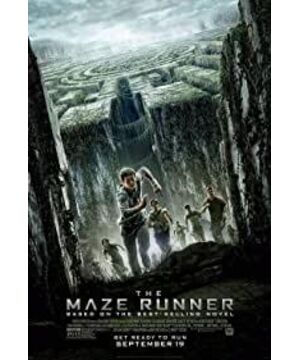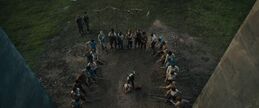The labyrinth is a tightly controlled experiment: the cages are delivered on time with supplies and new people, and the labyrinth is opened and closed on time. Wisdom in a secret room murder case and humanity in an enclosed space are two of the most captivating and engaging story types in an independent space. It is a pity that the opportunity of "Maze Runner" did not focus on the display and torture of human nature in a closed space, so it is impossible to bring back the reflection of the real world after watching the film or the shock of the innermost thoughts. So, does it make us feel the wisdom of that delicate secret room reasoning? The answer is of course: no.
The first half of the film did leave a huge suspense. The male and female protagonists as "variables" used their own (screenwriter settings) to promote the development of the story. This kind of external push is of course effective, but it seems a bit simple and light, it can not highlight the talent of the screenwriter, and it is likely to annoy the audience - we want to see wisdom, but who knows it will fly next time Get some crazy stuff. Of course, these are experimental procedures, so it's always acceptable not to be too fussy.
The suspenseful cloud of suspicion hangs over the labyrinth, and the answer to the mystery lies outside the labyrinth. No matter how noisy the labyrinth is, quarrels, confrontations, monster fights... these are all unimportant, because the fog has been generated from the beginning, and the film did not give effective information afterward for the audience to follow the hero to solve the mystery. Everything is like flying immortals from the sky. In addition to the above-mentioned "variable" male and female protagonists, there are also key props (the guide device taken out of the monster's body), and the medicine that can restore memory (that kind of big monster) when the monster attacks. Syringes are usually used to give injections to cows or pigs, so the male protagonist is really hard enough!). Although it is a story that solves a mystery, the process of reasoning does not inspire us as audiences to follow the protagonist's footsteps to explore the mystery. Therefore, on the basis of being naive, the whole film looks more like a display process - what we know is only what the picture shows, and they do not play a role in allowing us to explore forward. As a puzzle/reasoning film, the information that has been given cannot be smeared with ink on the rice paper, and it is doomed to fail.
After experiencing several "temple escapes", the male protagonist finally began to lead his brothers and sisters towards the light and the mystery under the guidance of the protagonist's halo. However, everything turned out to be another trap, and the story has no end. Not only is there no end, but the way to tell you that there is no end is quite crude, direct, and simple. It turns out that the doomsday is fake, the disaster is fake, and so is the suicide of the laboratory leader aunt Fake, these are just part of the experiment. It's like telling people a bunch of messy stories, and finally the protagonist wakes up from a dream or tells us that the protagonist is a patient in a mental hospital. This way of handling is full of clumsiness and aesthetic fatigue. It brings the audience a feeling of "being tricked". As for the real purpose of the experiment, it is still unclear, or it is completely unbelievable - doomsday disaster, infecting the virus, why is it to lock up a group of people for the experiment? Shouldn't it be more appropriate to study the internal factors (cells or genes) of the sample? Therefore, these claims are also part of the experiment. All actions and words are part of the experiment, everything is played according to the rules, and the subjective initiative of the protagonists is finally proved to be the set expected results.
The most basic meaning of dystopian novels/films is that readers and audiences can be shocked and inspired by reading texts or watching films, and then return to observe and think about a certain situation that has been or is deep in their own life or life. It allows us to see human nature and rules in the story, and to reflect on rights and institutions, spiritual and material, outside the story. The story of "Maze Runner" is full of noise, but it does not lead to shock or thinking, so the meaning outside the maze cannot be generated. Therefore, this movie is just a display counter. The teller behind the counter shows us what is on the counter, and we only see what, that's all, it is impossible to have the most superfluous thinking. It doesn't have a tangle of real and fictional, just a noise that lacks echo and aftertaste.
View more about The Maze Runner reviews











